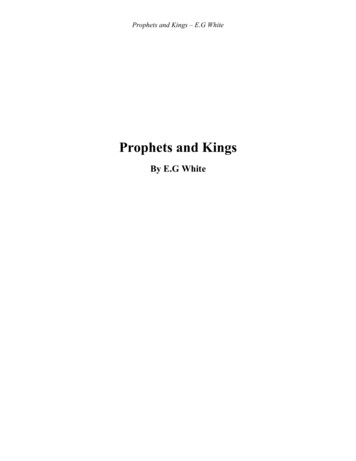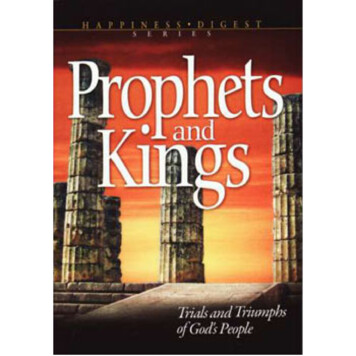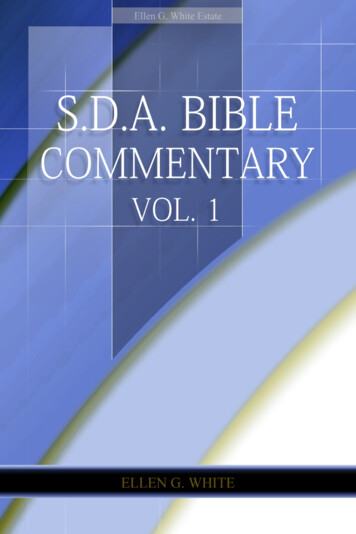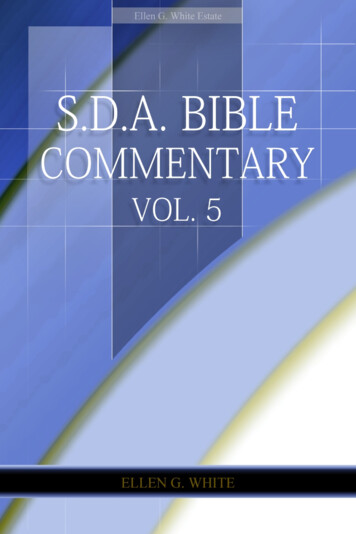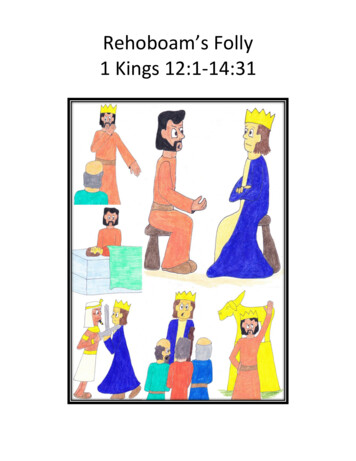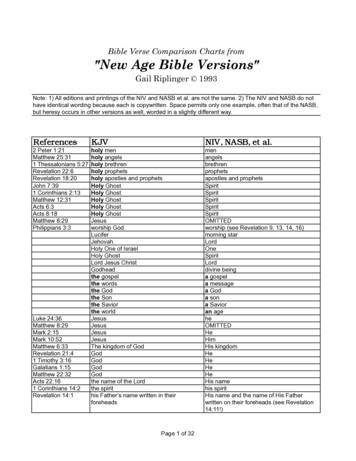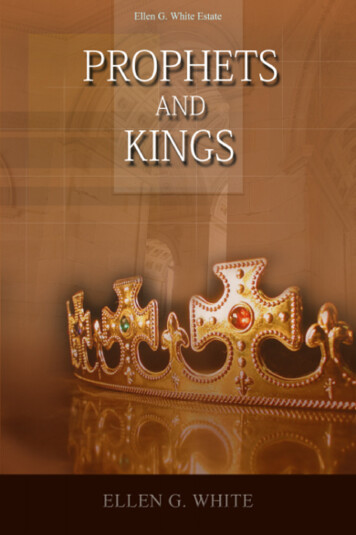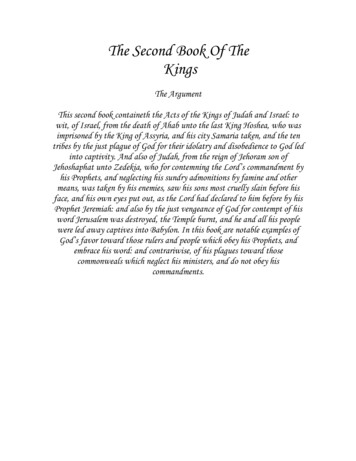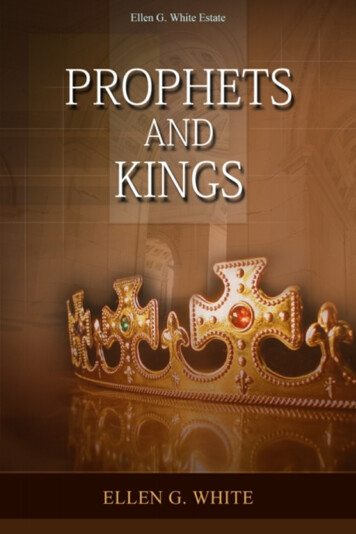
Transcription
Prophets and KingsEllen G. White1917Copyright 2017Ellen G. White Estate, Inc.
Information about this BookOverviewThis eBook is provided by the Ellen G. White Estate. It is includedin the larger free Online Books collection on the Ellen G. WhiteEstate Web site.About the AuthorEllen G. White (1827-1915) is considered the most widely translatedAmerican author, her works having been published in more than 160languages. She wrote more than 100,000 pages on a wide variety ofspiritual and practical topics. Guided by the Holy Spirit, she exaltedJesus and pointed to the Scriptures as the basis of one’s faith.Further LinksA Brief Biography of Ellen G. WhiteAbout the Ellen G. White EstateEnd User License AgreementThe viewing, printing or downloading of this book grants you onlya limited, nonexclusive and nontransferable license for use solelyby you for your own personal use. This license does not permitrepublication, distribution, assignment, sublicense, sale, preparationof derivative works, or other use. Any unauthorized use of this bookterminates the license granted hereby.Further InformationFor more information about the author, publishers, or how youcan support this service, please contact the Ellen G. White Estateat mail@whiteestate.org. We are thankful for your interest andfeedback and wish you God’s blessing as you read.i
ii
ForewordThe Story of Prophets and Kings is the second in a series of fiveoutstanding volumes spanning sacred history. It was, however, thelast book of the series to be written, and the last of many rich worksto come from the gifted pen of Ellen G. White. Through her seventyyears of speaking and writing in America and abroad, Mrs. Whiteever kept before the public the larger significance of the events ofhistory, revealing that in the affairs of men are to be detected theunseen influences of righteousness and evil—the hand of God andthe work of the great adversary.The author with deep insight in providential workings drawsthe curtain aside and reveals a philosophy of history by which theevents of the past take on eternal significance. She expressed thisphilosophy in this way:“The strength of nations and of individuals is not found in theopportunities and facilities that appear to make them invincible;It is not found in their boasted greatness. That which alone canmake them great or strong is the power and purpose of God. Theythemselves by their attitude toward His purpose, decide their owndestiny.“Human histories relate man’s achievements, his victories inbattle, his success in climbing to worldly greatness. God’s historydescribes man as heaven views him.”This volume, Prophets and Kings, opens with the account ofSolomon’s glorious reign over Israel, a united kingdom, with thetemple of Jehovah—the center of true worship. Here are traced thevicissitudes of a favored and chosen people, torn between allegianceto God and serving the gods of the nations about them. And hereare seen vividly, through a crucial period of this world’s history, thedramatic evidences of the raging conflict between Christ and Satanfor the hearts and allegiance of men.The book abounds in fascinating character studies—the wiseSolomon, whose wisdom did not keep him from transgression; Jer- [10]iii
oboam, the self-serving man of policy, and the evil results which followed his reign; The mighty and fearless Elijah; Elisha, the prophetof peace and healing; Ahaz, the fearful and wicked; Hezekiah, theloyal and good-hearted; Daniel, the beloved of God; Jeremiah, theprophet of sorrow; Haggai, Zechariah, and Malachi, prophets of therestoration. Beyond them all rises in glory the coming King, theLamb of God, the only-begotten Son, in whom the typical sacrificesfind fulfillment.Patriarchs and Prophets, the first book of the series, spans worldhistory from creation to the close of David’s reign; The Desire ofAges, the third book, treats of the life and ministry of Christ; thisvolume, Prophets and Kings fits between these two. The Acts ofthe Apostles, The fourth, portrays the history of the early Christianchurch, and The Great Controversy, the last in the series, traces theconflict story to our day and then on in a prophetic vein to the earthmade new.The Story of Prophets and Kings, having enjoyed a circulationwhich has demanded many printings since its first appearance, is nowpresented to the public in attractive form with type reset, but with nochange of text or pagination. This new edition is embellished withattractive illustrations, many of them original paintings designedespecially for this work.That this volume with its rich lessons of faith in God and HisSon, the Saviour of the world, and the stories of His providencein the lives of great men and women of Old Testament times maydeepen the religious experience and enlighten the minds of all whoread its pages is the sincere wish of the Publishers andThe Board of Trustees of the Ellen G. White Publications.
ContentsInformation about this Book . . . . . . . . . . . . . . . . . . . . . . . . . . . . iForeword . . . . . . . . . . . . . . . . . . . . . . . . . . . . . . . . . . . . . . . . . . . iiiIntroduction—The Vineyard of the Lord . . . . . . . . . . . . . . . . viiSection 1—From Strength to Weakness . . . . . . . . . . . . . . . . . . . 13Chapter 1—Solomon . . . . . . . . . . . . . . . . . . . . . . . . . . . . . . . . 14Chapter 2—The Temple and Its Dedication . . . . . . . . . . . . . . . 21Chapter 3—Pride of Prosperity . . . . . . . . . . . . . . . . . . . . . . . . 32Chapter 4—Results of Transgression . . . . . . . . . . . . . . . . . . . 39Chapter 5—Solomon’s Repentance . . . . . . . . . . . . . . . . . . . . . 49Chapter 6—The Rending of the Kingdom . . . . . . . . . . . . . . . . 57Chapter 7—Jeroboam . . . . . . . . . . . . . . . . . . . . . . . . . . . . . . . . 65Chapter 8—National Apostasy . . . . . . . . . . . . . . . . . . . . . . . . . 71Section 2—Prophets of the Northern Kingdom . . . . . . . . . . . . . . 77Chapter 9—Elijah the Tishbite . . . . . . . . . . . . . . . . . . . . . . . . 78Chapter 10—The Voice of Stern Rebuke . . . . . . . . . . . . . . . . 84Chapter 11—Carmel . . . . . . . . . . . . . . . . . . . . . . . . . . . . . . . . . . 97Chapter 12—From Jezreel to Horeb . . . . . . . . . . . . . . . . . . . 107Chapter 13—“What Doest Thou Here?” . . . . . . . . . . . . . . . 118Chapter 14—“In the Spirit and Power of Elias” . . . . . . . . . 128Chapter 15—Jehoshaphat . . . . . . . . . . . . . . . . . . . . . . . . . . . . 140Chapter 16—The Fall of the House of Ahab . . . . . . . . . . . . 152Chapter 17—The Call of Elisha . . . . . . . . . . . . . . . . . . . . . . 165Chapter 18—The Healing of the Waters . . . . . . . . . . . . . . . . 176Chapter 19—A Prophet of Peace . . . . . . . . . . . . . . . . . . . . . . 182Chapter 20—Naaman . . . . . . . . . . . . . . . . . . . . . . . . . . . . . . . 190Chapter 21—Elisha’s Closing Ministry . . . . . . . . . . . . . . . . 198Chapter 22—“Nineveh, That Great City” . . . . . . . . . . . . . . . 208Chapter 23—The Assyrian Captivity . . . . . . . . . . . . . . . . . . 222Chapter 24—“Destroyed for Lack of Knowledge” . . . . . . . 234Section 3—A Preacher of Righteousness . . . . . . . . . . . . . . . . . 243Chapter 25—The Call of Isaiah . . . . . . . . . . . . . . . . . . . . . . . 244Chapter 26—“Behold Your God!” . . . . . . . . . . . . . . . . . . . . 252Chapter 27—Ahaz . . . . . . . . . . . . . . . . . . . . . . . . . . . . . . . . . 263Chapter 28—Hezekiah . . . . . . . . . . . . . . . . . . . . . . . . . . . . . . 273v
viProphets and KingsChapter 29—The Ambassadors From Babylon . . . . . . . . . .Chapter 30—Deliverance From Assyria . . . . . . . . . . . . . . . .Chapter 31—Hope for the Heathen . . . . . . . . . . . . . . . . . . . .Section 4—National Retribution . . . . . . . . . . . . . . . . . . . . . . . .Chapter 32—Manasseh and Josiah . . . . . . . . . . . . . . . . . . . .Chapter 33—The Book of the Law . . . . . . . . . . . . . . . . . . . .Chapter 34—Jeremiah . . . . . . . . . . . . . . . . . . . . . . . . . . . . . .Chapter 35—Approaching Doom . . . . . . . . . . . . . . . . . . . . .Chapter 36—The Last King of Judah . . . . . . . . . . . . . . . . . .Chapter 37—Carried Captive Into Babylon . . . . . . . . . . . . .Chapter 38—Light Through Darkness . . . . . . . . . . . . . . . . .Section 5—In the Lands of the Heathen . . . . . . . . . . . . . . . . . .Chapter 39—In the Court of Babylon . . . . . . . . . . . . . . . . . .Chapter 40—Nebuchadnezzar’s Dream . . . . . . . . . . . . . . . .Chapter 41—The Fiery Furnace . . . . . . . . . . . . . . . . . . . . . .Chapter 42—True Greatness . . . . . . . . . . . . . . . . . . . . . . . . .Chapter 43—The Unseen Watcher . . . . . . . . . . . . . . . . . . . .Chapter 44—In the Lions’ Den . . . . . . . . . . . . . . . . . . . . . . .Section 6—After the Exile . . . . . . . . . . . . . . . . . . . . . . . . . . . . .Chapter 45—The Return of the Exiles . . . . . . . . . . . . . . . . .Chapter 46—“The Prophets of God Helping Them” . . . . . .Chapter 47—Joshua and the Angel . . . . . . . . . . . . . . . . . . . .Chapter 48—“Not by Might, nor by Power” . . . . . . . . . . . .Chapter 49—In the Days of Queen Esther . . . . . . . . . . . . . .Chapter 50—Ezra, the Priest and Scribe . . . . . . . . . . . . . . . .Chapter 51—A Spiritual Revival . . . . . . . . . . . . . . . . . . . . . .Chapter 52—A Man of Opportunity . . . . . . . . . . . . . . . . . . .Chapter 53—The Builders on the Wall . . . . . . . . . . . . . . . . .Chapter 54—A Rebuke Against Extortion . . . . . . . . . . . . . .Chapter 55—Heathen Plots . . . . . . . . . . . . . . . . . . . . . . . . . .Chapter 56—Instructed in the Law of God . . . . . . . . . . . . .Chapter 57—Reformation . . . . . . . . . . . . . . . . . . . . . . . . . . .Section 7—Light at Eventide . . . . . . . . . . . . . . . . . . . . . . . . . . .Chapter 58—The Coming of a Deliverer . . . . . . . . . . . . . . .Chapter 59—“The House of Israel” . . . . . . . . . . . . . . . . . . .Chapter 60—Visions of Future Glory . . . . . . . . . . . . . . . . . 788825856
Introduction—The Vineyard of the Lord[11]It was for the purpose of bringing the best gifts of Heaven to allthe peoples of earth that God called Abraham out from his idolatrouskindred and bade him dwell in the land of Canaan. “I will make ofthee a great nation,” He said, “and I will bless thee, and make thyname great; and thou shalt be a blessing.” Genesis 12:2. It was ahigh honor to which Abraham was called—that of being the father ofthe people who for centuries were to be the guardians and preserversof the truth of God to the world, the people through whom all thenations of the earth should be blessed in the advent of the promisedMessiah.Men had well-nigh lost the knowledge of the true God. Theirminds were darkened by idolatry. For the divine statutes, which are“holy, and just, and good” (Romans 7:12), men were endeavoring tosubstitute laws in harmony with the purposes of their own cruel, selfish hearts. Yet God in His mercy did not blot them out of existence.He purposed to give them opportunity for becoming acquainted withHim through His church. He designed that the principles revealed [16]through His people should be the means of restoring the moral imageof God in man.God’s law must be exalted, His authority maintained; and to thehouse of Israel was given this great and noble work. God separatedthem from the world, that He might commit to them a sacred trust.He made them the depositaries of His law, and He purposed throughthem to preserve among men the knowledge of Himself. Thus thelight of heaven was to shine out to a world enshrouded in darkness,and a voice was to be heard appealing to all peoples to turn fromidolatry to serve the living God.“With great power, and with a mighty hand,” God brought Hischosen people out of the land of Egypt. Exodus 32:11. “He sentMoses His servant; and Aaron whom He had chosen. They showedHis signs among them, and wonders in the land of Ham.” “Herebuked the Red Sea also, and it was dried up: so He led themvii
viiiProphets and Kingsthrough the depths.” Psalm 105:26, 27; 106:9. He rescued themfrom their servile state, that He might bring them to a good land, aland which in His providence He had prepared for them as a refugefrom their enemies. He would bring them to Himself and encirclethem in His everlasting arms; and in return for His goodness andmercy they were to exalt His name and make it glorious in the earth.[17]“The Lord’s portion is His people; Jacob is the lot of His inheritance. He found him in a desert land, and in the waste howlingwilderness; He led him about, He instructed him, He kept him asthe apple of His eye. As an eagle stirreth up her nest, fluttereth overher young, spreadeth abroad her wings, taketh them, beareth themon her wings: so the Lord alone did lead him, and there was nostrange god with him.” Deuteronomy 32:9-12. Thus He brought theIsraelites unto Himself, that they might dwell as under the shadowof the Most High. Miraculously preserved from the perils of thewilderness wandering, they were finally established in the Land ofPromise as a favored nation.By means of a parable, Isaiah has told with touching pathos thestory of Israel’s call and training to stand in the world as Jehovah’srepresentatives, fruitful in every good work:“Now will I sing to my well-beloved a song of my belovedtouching His vineyard. My well-beloved hath a vineyard in a veryfruitful hill: and He fenced it, and gathered out the stones thereof,and planted it with the choicest vine, and built a tower in the midst ofit, and also made a wine press therein: and He looked that it shouldbring forth grapes.” Isaiah 5:1, 2.Through the chosen nation, God had purposed to bring blessing[18] to all mankind. “The vineyard of the Lord of hosts,” the prophetdeclared, “is the house of Israel, and the men of Judah His pleasantplant.” Isaiah 5:7.To this people were committed the oracles of God. They werehedged about by the precepts of His law, the everlasting principlesof truth, justice, and purity. Obedience to these principles was to betheir protection, for it would save them from destroying themselvesby sinful practices. And as the tower in the vineyard, God placed inthe midst of the land His holy temple.Christ was their instructor. As He had been with them in thewilderness, so He was still to be their teacher and guide. In the
Introduction—The Vineyard of the Lordixtabernacle and the temple His glory dwelt in the holy Shekinahabove the mercy seat. In their behalf He constantly manifested theriches of His love and patience.Through Moses the purpose of God was set before them and theterms of their prosperity made plain. “Thou art an holy people untothe Lord thy God,” he said; “the Lord thy God hath chosen thee tobe a special people unto Himself, above all people that are upon theface of the earth.”“Thou hast avouched the Lord this day to be thy God, and towalk in His ways, and to keep His statutes, and His commandments,and His judgments, and to hearken unto His voice: and the Lordhath avouched thee this day to be His peculiar people, as He hathpromised thee, and that thou shouldest keep all His commandments;and to make thee high above all nations which He hath made, in [19]praise, and in name, and in honor; and that thou mayest be an holypeople unto the Lord thy God, as He hath spoken.” Deuteronomy7:6; 26:17-19.The children of Israel were to occupy all the territory whichGod appointed them. Those nations that rejected the worship andservice of the true God were to be dispossessed. But it was God’spurpose that by the revelation of His character through Israel menshould be drawn unto Him. To all the world the gospel invitationwas to be given. Through the teaching of the sacrificial service,Christ was to be uplifted before the nations, and all who would lookunto Him should live. All who, like Rahab the Canaanite and Ruththe Moabitess, turned from idolatry to the worship of the true Godwere to unite themselves with His chosen people. As the numbersof Israel increased, they were to enlarge their borders until theirkingdom should embrace the world.But ancient Israel did not fulfill God’s purpose. The Lord declared, “I had planted thee a noble vine, wholly a right seed: howthen art thou turned into the degenerate plant of a strange vine untoMe?” “Israel is an empty vine, he bringeth forth fruit unto himself.”“And now, O inhabitants of Jerusalem, and men of Judah, judge, Ipray you, betwixt Me and My vineyard. What could have been donemore to My vineyard, that I have not done in it? Wherefore, when Ilooked that it should bring forth grapes, brought it forth wild grapes? [20]And now go to; I will tell you what I will do to My vineyard: I
xProphets and Kingswill take away the hedge thereof, and it shall be eaten up; and breakdown the wall thereof, and it shall be trodden down: and I will layit waste: it shall not be pruned, nor digged; but there shall come upbriers and thorns: I will also command the clouds that they rain norain upon it. For . He looked for judgment, but behold oppression;for righteousness, but behold a cry.” Jeremiah 2:21; Hosea 10:1;Isaiah 5:3-7.The Lord had through Moses set before His people the resultof unfaithfulness. By refusing to keep His covenant, they wouldcut themselves off from the life of God, and His blessing could notcome upon them. At times these warnings were heeded, and richblessings were bestowed upon the Jewish nation and through themupon surrounding peoples. But more often in their history they forgotGod and lost sight of their high privilege as His representatives. Theyrobbed Him of the service He required of them, and they robbedtheir fellow men of religious guidance and a holy example. Theydesired to appropriate to themselves the fruits of the vineyard overwhich they had been made stewards. Their covetousness and greedcaused them to be despised even by the heathen. Thus the Gentile[21] world was given occasion to misinterpret the character of God andthe laws of His kingdom.With a father’s heart, God bore with His people. He pleadedwith them by mercies given and mercies withdrawn. Patiently Heset their sins before them and in forbearance waited for their acknowledgment. Prophets and messengers were sent to urge Hisclaim upon the husbandmen; but, instead of being welcomed, thesemen of discernment and spiritual power were treated as enemies.The husbandmen persecuted and killed them. God sent still othermessengers, but they received the same treatment as the first, onlythat the husbandmen showed still more determined hatred.The withdrawal of divine favor during the period of the Exileled many to repentance, yet after their return to the Land of Promisethe Jewish people repeated the mistakes of former generations andbrought themselves into political conflict with surrounding nations.The prophets whom God sent to correct the prevailing evils werereceived with the same suspicion and scorn that had been accordedthe messengers of earlier times; and thus, from century to century,the keepers of the vineyard added to their guilt.
Introduction—The Vineyard of the LordxiThe goodly vine planted by the divine Husbandman upon thehills of Palestine was despised by the men of Israel and was finallycast over the vineyard wall; they bruised it and trampled it under their [22]feet and hoped that they had destroyed it forever. The Husbandmanremoved the vine and concealed it from their sight. Again He plantedit, but on the other side of the wall and in such a manner that thestock was no longer visible. The branches hung over the wall, andgrafts might be joined to it; but the stem itself was placed beyondthe power of men to reach or harm.Of special value to God’s church on earth today—the keepers ofHis vineyard—are the messages of counsel and admonition giventhrough the prophets who have made plain His eternal purpose inbehalf of mankind. In the teachings of the prophets, His love forthe lost race and His plan for their salvation are clearly revealed.The story of Israel’s call, of their successes and failures, of theirrestoration to divine favor, of their rejection of the Master of thevineyard, and of the carrying out of the plan of the ages by a goodlyremnant to whom are to be fulfilled all the covenant promises—thishas been the theme of God’s messengers to His church throughoutthe centuries that have passed. And today God’s message to Hischurch—to those who are occupying His vineyard as faithful husbandmen—is none other than that spoken through the prophet ofold:“Sing ye unto her, A vineyard of red wine. I theLord do keep it; I will water it every moment: lest anyhurt it, I will keep it night and day.” Isaiah 27:2, 3.Let Israel hope in God. The Master of the vineyard is even nowgathering from among men of all nations and peoples the preciousfruits for which He has long been waiting. Soon He will come untoHis own; and in that glad day His eternal purpose for the house ofIsrael will finally be fulfilled. “He shall cause them that come ofJacob to take root: Israel shall blossom and bud, and fill the face ofthe world with fruit.” Verse 6.
xiiProphets and Kings
Section 1—From Strength to Weakness[23][24]“Thus saith the Lord, Let not the wise man glory in his wisdom,neither let the mighty man glory in his might, let not the rich manglory in his riches: but let him that glorieth glory in this, that heunderstandeth and knoweth Me, that I am the Lord which exerciseloving-kindness, judgment, and righteousness, in the earth: for inthese things I delight, saith the Lord.” Jeremiah 9:23, 24.
[25]Chapter 1—SolomonIn the reign of David and Solomon, Israel became strong amongthe nations and had many opportunities to wield a mighty influencein behalf of truth and the right. The name of Jehovah was exaltedand held in honor, and the purpose for which the Israelites hadbeen established in the Land of Promise bade fair of meeting withfulfillment. Barriers were broken down, and seekers after truthfrom the lands of the heathen were not turned away unsatisfied.Conversions took place, and the church of God on earth was enlargedand prospered.Solomon was anointed and proclaimed king in the closing yearsof his father David, who abdicated in his favor. His early life wasbright with promise, and it was God’s purpose that he should goon from strength to strength, from glory to glory, ever approachingnearer the similitude of the character of God, and thus inspiring Hispeople to fulfill their sacred trust as the depositaries of divine truth.[26]David knew that God’s high purpose for Israel could be met onlyas rulers and people should seek with unceasing vigilance to attainto the standard placed before them. He knew that in order for his sonSolomon to fulfill the trust with which God was pleased to honorhim, the youthful ruler must be not merely a warrior, a statesman,and a sovereign, but a strong, good man, a teacher of righteousness,an example of fidelity.With tender earnestness David entreated Solomon to be manlyand noble, to show mercy and loving-kindness to his subjects, andin all his dealings with the nations of earth to honor and glorify thename of God and to make manifest the beauty of holiness. The manytrying and remarkable experiences through which David had passedduring his lifetime had taught him the value of the nobler virtuesand led him to declare in his dying charge to Solomon: “He thatruleth over men must be just, ruling in the fear of God. And he shallbe as the light of the morning, when the sun riseth, even a morning14
Solomon15without clouds; as the tender grass springing out of the earth by clearshining after rain.” 2 Samuel 23:3, 4.Oh, what an opportunity was Solomon’s! Should he follow thedivinely inspired instruction of his father, his reign would be a reignof righteousness, like that described in the seventy-second psalm:“Give the king Thy judgments, O God,And Thy righteousness unto the king’s son.He shall judge Thy people with righteousness,And Thy poor with judgment.He shall come down like rain upon the mown grass:As showers that water the earth.In his days shall the righteous flourish;And abundance of peace so long as the moon endureth.He shall have dominion also from sea to sea,And from the river unto the ends of the earth.The kings of Tarshish and of the isles shall bring presents:The kings of Sheba and Seba shall offer gifts.Yea, all kings shall fall down before him:All nations shall serve him.For he shall deliver the needy when he crieth;The poor also, and him that hath no helper.Prayer also shall be made for him continually;And daily shall he be praised.His name shall endure forever:His name shall be continued as long as the sun:And men shall be blessed in him:All nations shall call him blessed.“Blessed be the Lord God, the God of Israel,Who only doeth wondrous things.And blessed be His glorious name forever:And let the whole earth be filled with His glory;Amen, and Amen.”In his youth Solomon made David’s choice his own, and for manyyears he walked uprightly, his life marked with strict obedience to[27]
16Prophets and KingsGod’s commands. Early in his reign he went with his counselorsof state to Gibeon, where the tabernacle that had been built in thewilderness still was, and there he united with his chosen advisers,“the captains of thousands and of hundreds,” “the judges,” and “everygovernor in all Israel, the chief of the fathers,” in offering sacrificesto God and in consecrating themselves fully to the Lord’s service.2 Chronicles 1:2. Comprehending something of the magnitude ofthe duties connected with the kingly office, Solomon knew that[28] those bearing heavy burdens must seek the Source of Wisdom forguidance, if they would fulfill their responsibilities acceptably. Thisled him to encourage his counselors to unite with him heartily inmaking sure of their acceptance with God.Above every earthly good, the king desired wisdom and understanding for the accomplishment of the work God had given himto do. He longed for quickness of mind, for largeness of heart, fortenderness of spirit. That night the Lord appeared to Solomon in adream and said, “Ask what I shall give thee.” In his answer the youngand inexperienced ruler gave utterance to his feeling of helplessnessand his desire for aid. “Thou hast showed unto Thy servant Davidmy father great mercy,” he said, “according as he walked beforeThee in truth, and in righteousness, and in uprightness of heart withThee; and Thou hast kept for him this great kindness, that Thou hastgiven him a son to sit on his throne, as it is this day.“And now, O Lord my God, Thou hast made Thy servant kinginstead of David my father: and I am but a little child: I knownot how to go out or come in. And Thy servant is in the midst ofThy people which Thou hast chosen, a great people, that cannot benumbered nor counted for multitude. Give therefore Thy servant anunderstanding heart to judge Thy people, that I may discern betweengood and bad: for who is able to judge this Thy so great a people?“And the speech pleased the Lord, that Solomon had asked thisthing.”“Because this was in thine heart,” God said to Solomon, “andthou hast not asked riches, wealth, or honor, nor the life of thineenemies, neither yet hast asked long life; but hast asked wisdom and[29] knowledge for thyself, that thou mayest judge My people,” “behold,I have done according to thy words: lo, I have given thee a wise andan understanding heart; so that there was none like thee before thee,
Solomon17neither after thee shall any arise like unto thee. And I have also giventhee that which thou hast not asked, both riches, and honor,” “suchas none of the kings have had that have been before thee, neithershall there any after thee have the like.”“And if thou wilt walk in My ways, to keep My statutes and Mycommandments, as thy father David did walk, then I will lengthenthy days.” 1 Kings 3:5-14; 2 Chronicles 1:7-12.God promised that as He had been with David, so He would be [30]with Solomon. If the king would walk before the Lord in uprightness,if he would do what God had commanded him, his throne wouldbe established and his reign would be the means of exalting Israelas “a wise and understanding people,” the light of the surroundingnations. Deuteronomy 4:6.The language used by Solomon while praying to God before theancient altar at Gibeon reveals his humility and his strong desire tohonor God. He realized that without divine aid he was as helpless asa little child to fulfill the responsibilities resting on him. He knewthat he lacked discernment, and it was a sense of his great need thatled him to seek God for wisdom. In his heart there was no selfishaspirations for a knowledge that would exalt him above others. Hedesired to discharge faithfully the duties devolving upon him, and hechose the gift that would be the means of causing his reign to bringglory to God. Solomon was never so rich or so wise or so truly greatas when he confessed, “I am but a little child: I know not how to goout or come in.”Those who today occupy positions of trust should seek to learnthe lesson taught by Solomon’s prayer. The higher the position aman occupies, the greater the responsibility that he has to bear, thewider will be the influence that he exerts and the greater his need ofdependence on God. Ever should he remember that with the call towork comes the call to walk circumspectly before his fellow men.He is to stand before God in the attitude of a learner. Position doesnot give holiness of character. It is by honoring God and obeying [31]His commands that a man is made truly great.The God whom we serve is no respecter of persons. He whogave to Solomon the spirit of wise discernment is willing to impartthe same blessing to His children today. “
oboam, the self-serving man of policy, and the evil results which fol-lowed his reign; The mighty and fearless Elijah; Elisha, the prophet of peace and healing; Ahaz, the fearful and wicked; Hezekiah, the


